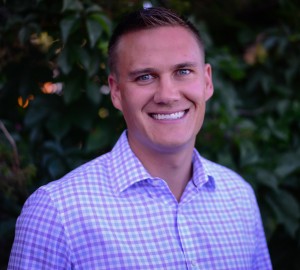An Aurora residential brokerage that charges a flat fee instead of a percent of the sale price is adding more space to its headquarters and branching out to four new cities.
Redefy Real Estate – which charges home sellers a flat fee of $2,500 rather than charging a commission – added its 10th brokerage in Las Vegas late in October and will officially open spots in Salt Lake City, Utah; San Antonio, Texas; and Raleigh, North Carolina, this month.
“We say, to sell a $500,000 house is no more challenging than to sell a $200,000 house. It’s the same process. But in a traditional model, you make $15,000 on a $500,000 house and $6,000 on a $200,000 house,” co-founder and CEO Jordan Connett said. “Why? Nobody understands why. Outside of, ‘Because we can,’ this is how it’s always been done.”
Back in Aurora, the company blew out a wall to expand its offices by 4,000 square feet and make way for 12 more employees. Right now the firm operates a call center and has 33 full-time employees in a 10,500-square-foot space at 2675 S. Abilene St.
Traditionally, real estate firms charge commissions based on the price of a final home sale with buyer’s agents and listing agent each taking a 3 percent cut. Redefy charges a flat fee but suggests that homebuyers pay their agents 3 percent.
Because the commission on high-priced properties is well over $2,500, Redefy has to make it up by selling more properties, Connett said.
“People from the traditional real estate world don’t know how to run what we run because it’s a unit-based model,” he said.
The proof of that system is in the numbers, Connett said: The company closed 1,000 transactions this year.
Homeowners that use Redefy to sell their properties work with two employees: an in-house agent that lists and markets homes and a field agent that shows and negotiates properties until they close. It’s a system Connett said is helping his company to list and sell more houses, since agents that are great at marketing don’t have to show houses, and agents that are better at negotiating and closing don’t appraise and list properties.
Redefy agents can charge a commission if they turn around to become a buyer’s agent after selling a property, Connett said.
“Real estate has never decentralized the real estate agent,” said Connett. “We divide out roles and responsibilities within the transaction.”
Redefy is expanding through corporate-owned and franchised offices. Franchisees pay $30,000 upfront plus royalties, Connett said, and then can either opt to operate the office themselves or turn over operations to Redefy’s corporate headquarters in exchange for giving up an equity stake in their office.
A new franchise needs a minimum of three employees to open, Connett said, and each office gets capped at about 20 real estate agents. The goal is for franchises to close between 175 and 200 properties in their first year and reach profitability by selling 650 properties annually by their third year, he said.
By the end of 2015, Redefy will have brokerages active in 17 markets across seven states from South Carolina to Arizona, Connett said.
Connett said Redefy also brings in revenue by owning title companies in Colorado, Florida and Texas.
Redefy is not the first Denver-based flat-fee real estate brokerages to expand this year. In September, Trelora announced it was opening a second office in Fort Collins and disclosed that it had raised $435,000 of a $1.2 million target in October.
An Aurora residential brokerage that charges a flat fee instead of a percent of the sale price is adding more space to its headquarters and branching out to four new cities.
Redefy Real Estate – which charges home sellers a flat fee of $2,500 rather than charging a commission – added its 10th brokerage in Las Vegas late in October and will officially open spots in Salt Lake City, Utah; San Antonio, Texas; and Raleigh, North Carolina, this month.
“We say, to sell a $500,000 house is no more challenging than to sell a $200,000 house. It’s the same process. But in a traditional model, you make $15,000 on a $500,000 house and $6,000 on a $200,000 house,” co-founder and CEO Jordan Connett said. “Why? Nobody understands why. Outside of, ‘Because we can,’ this is how it’s always been done.”
Back in Aurora, the company blew out a wall to expand its offices by 4,000 square feet and make way for 12 more employees. Right now the firm operates a call center and has 33 full-time employees in a 10,500-square-foot space at 2675 S. Abilene St.
Traditionally, real estate firms charge commissions based on the price of a final home sale with buyer’s agents and listing agent each taking a 3 percent cut. Redefy charges a flat fee but suggests that homebuyers pay their agents 3 percent.
Because the commission on high-priced properties is well over $2,500, Redefy has to make it up by selling more properties, Connett said.
“People from the traditional real estate world don’t know how to run what we run because it’s a unit-based model,” he said.
The proof of that system is in the numbers, Connett said: The company closed 1,000 transactions this year.
Homeowners that use Redefy to sell their properties work with two employees: an in-house agent that lists and markets homes and a field agent that shows and negotiates properties until they close. It’s a system Connett said is helping his company to list and sell more houses, since agents that are great at marketing don’t have to show houses, and agents that are better at negotiating and closing don’t appraise and list properties.
Redefy agents can charge a commission if they turn around to become a buyer’s agent after selling a property, Connett said.
“Real estate has never decentralized the real estate agent,” said Connett. “We divide out roles and responsibilities within the transaction.”
Redefy is expanding through corporate-owned and franchised offices. Franchisees pay $30,000 upfront plus royalties, Connett said, and then can either opt to operate the office themselves or turn over operations to Redefy’s corporate headquarters in exchange for giving up an equity stake in their office.
A new franchise needs a minimum of three employees to open, Connett said, and each office gets capped at about 20 real estate agents. The goal is for franchises to close between 175 and 200 properties in their first year and reach profitability by selling 650 properties annually by their third year, he said.
By the end of 2015, Redefy will have brokerages active in 17 markets across seven states from South Carolina to Arizona, Connett said.
Connett said Redefy also brings in revenue by owning title companies in Colorado, Florida and Texas.
Redefy is not the first Denver-based flat-fee real estate brokerages to expand this year. In September, Trelora announced it was opening a second office in Fort Collins and disclosed that it had raised $435,000 of a $1.2 million target in October.



Brilliant!